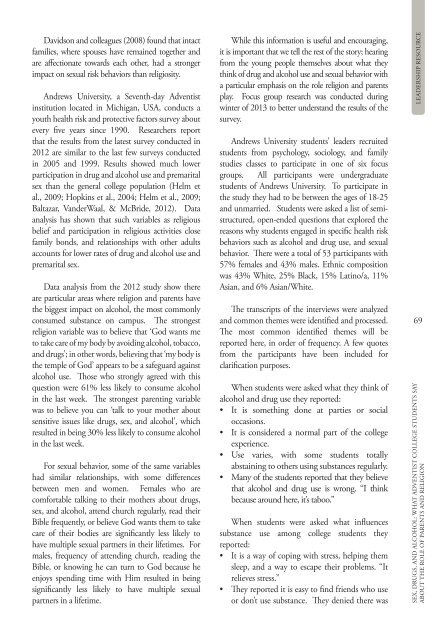HEALTHY FAMILIES FOR ETERNITY
FM_Planbook%202016-eng
FM_Planbook%202016-eng
Create successful ePaper yourself
Turn your PDF publications into a flip-book with our unique Google optimized e-Paper software.
Davidson and colleagues (2008) found that intact<br />
families, where spouses have remained together and<br />
are affectionate towards each other, had a stronger<br />
impact on sexual risk behaviors than religiosity.<br />
Andrews University, a Seventh-day Adventist<br />
institution located in Michigan, USA, conducts a<br />
youth health risk and protective factors survey about<br />
every five years since 1990. Researchers report<br />
that the results from the latest survey conducted in<br />
2012 are similar to the last few surveys conducted<br />
in 2005 and 1999. Results showed much lower<br />
participation in drug and alcohol use and premarital<br />
sex than the general college population (Helm et<br />
al., 2009; Hopkins et al., 2004; Helm et al., 2009;<br />
Baltazar, VanderWaal, & McBride, 2012). Data<br />
analysis has shown that such variables as religious<br />
belief and participation in religious activities close<br />
family bonds, and relationships with other adults<br />
accounts for lower rates of drug and alcohol use and<br />
premarital sex.<br />
Data analysis from the 2012 study show there<br />
are particular areas where religion and parents have<br />
the biggest impact on alcohol, the most commonly<br />
consumed substance on campus. The strongest<br />
religion variable was to believe that ‘God wants me<br />
to take care of my body by avoiding alcohol, tobacco,<br />
and drugs’; in other words, believing that ‘my body is<br />
the temple of God’ appears to be a safeguard against<br />
alcohol use. Those who strongly agreed with this<br />
question were 61% less likely to consume alcohol<br />
in the last week. The strongest parenting variable<br />
was to believe you can ‘talk to your mother about<br />
sensitive issues like drugs, sex, and alcohol’, which<br />
resulted in being 30% less likely to consume alcohol<br />
in the last week.<br />
For sexual behavior, some of the same variables<br />
had similar relationships, with some differences<br />
between men and women. Females who are<br />
comfortable talking to their mothers about drugs,<br />
sex, and alcohol, attend church regularly, read their<br />
Bible frequently, or believe God wants them to take<br />
care of their bodies are significantly less likely to<br />
have multiple sexual partners in their lifetimes. For<br />
males, frequency of attending church, reading the<br />
Bible, or knowing he can turn to God because he<br />
enjoys spending time with Him resulted in being<br />
significantly less likely to have multiple sexual<br />
partners in a lifetime.<br />
While this information is useful and encouraging,<br />
it is important that we tell the rest of the story; hearing<br />
from the young people themselves about what they<br />
think of drug and alcohol use and sexual behavior with<br />
a particular emphasis on the role religion and parents<br />
play. Focus group research was conducted during<br />
winter of 2013 to better understand the results of the<br />
survey.<br />
Andrews University students’ leaders recruited<br />
students from psychology, sociology, and family<br />
studies classes to participate in one of six focus<br />
groups. All participants were undergraduate<br />
students of Andrews University. To participate in<br />
the study they had to be between the ages of 18-25<br />
and unmarried. Students were asked a list of semistructured,<br />
open-ended questions that explored the<br />
reasons why students engaged in specific health risk<br />
behaviors such as alcohol and drug use, and sexual<br />
behavior. There were a total of 53 participants with<br />
57% females and 43% males. Ethnic composition<br />
was 43% White, 25% Black, 15% Latino/a, 11%<br />
Asian, and 6% Asian/White.<br />
The transcripts of the interviews were analyzed<br />
and common themes were identified and processed.<br />
The most common identified themes will be<br />
reported here, in order of frequency. A few quotes<br />
from the participants have been included for<br />
clarification purposes.<br />
When students were asked what they think of<br />
alcohol and drug use they reported:<br />
• It is something done at parties or social<br />
occasions.<br />
• It is considered a normal part of the college<br />
experience.<br />
• Use varies, with some students totally<br />
abstaining to others using substances regularly.<br />
• Many of the students reported that they believe<br />
that alcohol and drug use is wrong. “I think<br />
because around here, it’s taboo.”<br />
When students were asked what influences<br />
substance use among college students they<br />
reported:<br />
• It is a way of coping with stress, helping them<br />
sleep, and a way to escape their problems. “It<br />
relieves stress.”<br />
• They reported it is easy to find friends who use<br />
or don’t use substance. They denied there was<br />
LEADERSHIP RESOURCE<br />
69<br />
SEX, DRUGS, AND ALCOHOL: WHAT ADVENTIST COLLEGE STUDENTS SAY<br />
ABOUT THE ROLE OF PARENTS AND RELIGION


